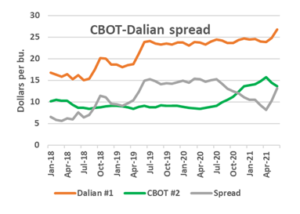Although thought of as a commodity, there have long been discrete markets within the soybean complex. Explicitly, this would include markets and premiums for non-GM or organic soybeans and, more recently, for soybeans with novel fatty acid profiles, namely high-oleic. While these premiums have been clear and publicized there have also long been implicit “markets”, where growers may be rewarded or penalized, often unknowingly, on characteristics that might prevail in their geography – protein concentration being a good example of this.
There are a number of reasons to believe that this decommoditization of soybeans has just begun. At a minimum, climate change and deforestation protocols will place greater emphasis on the provenance of soybeans going forward. Beyond the requirements of governments and NGOs, a more “discerning” customer base will expect more transparency in terms of where their food comes from.
Because of good soybean quality, short supply chains and proximity to o ur customers, North Carolina soybean growers stand to benefit from this development long term. In the near term, meanwhile, extremely high premiums for non-GM, organic soybeans in China, traded as No.1 Soybeans on the Dalian Commodity Exchange, have led to an influx of calls from overseas buyers looking for supply in the state.
ur customers, North Carolina soybean growers stand to benefit from this development long term. In the near term, meanwhile, extremely high premiums for non-GM, organic soybeans in China, traded as No.1 Soybeans on the Dalian Commodity Exchange, have led to an influx of calls from overseas buyers looking for supply in the state.
To facilitate interactions between growers and buyers the NCSPA has created a “Marketplace” tab on its website. There, buyers can create profiles, outline quality and delivery specifications for soybeans sought while farmers can browse these listings and engage with buyers if they so choose.
Interested in engaging with buyers of specialty and commodity soybeans directly?
Register and view listings at:








